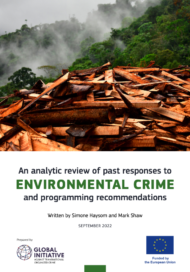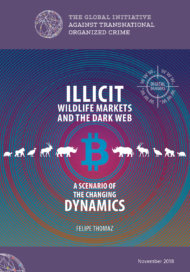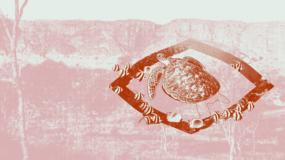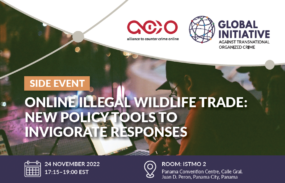Posted on 27 Sep 2022
Over the past 15 years, there has been significant growth in awareness that environmental crime constitutes serious organized crime. There has also been a development of laws and policies to accompany that. However, despite the urgency and importance of the issue, responses still fall far short of what is needed. Leading scientists have contributed to these shifts in awareness by producing major syntheses that delineate the vast scale of global risk that environmental damage is unleashing.
The Intergovernmental Panel on Climate Change (IPPC) and Intergovernmental Science-Policy Platform on Biodiversity and Ecosystem Services (IPBES) have both released dire warnings, with the landmark 2019 IPBES report concluding that over a million species are at risk of extinction in the coming decades. IPBES has also warned that environmental crisis undermines progress towards 80% of the assessed targets of the Sustainable Development Goals (SDGs). Environmental crime has a key and underappreciated role in this developing crisis.
Our analysis shows that all of the contributing factors identified by IPBES have both direct and indirect connections to criminal networks and transnational criminal flows. We also know that, at its worst, environmental crime is intimately bound up with threats to global peace and stability. It provides a soft entry point into global illicit flows for traffickers, and is often accompanied by widespread human rights abuses and dispossession by criminal networks and actors.
The corruption related to environmental crime can be so damaging that it creates political instability and entrenches systems of patronage or the elite capture of democratic institutions. While there has been a significant increase in multilateral investments in responding to wildlife and timber crime, some of these interventions are themselves producing harms that outweigh or undermine their benefits. Human-rights abuses, such as torture, rape and displacement, are also bound up in militarized responses to environmental crime. All of this points to the conclusion that the international community is still failing to support effective, sustainable ways of combatting environmental crime. There is still much to do and much to learn – all within a narrow window of time. The severity of these problems and the pressing time constraints on responding are linked to their intersection with other crises – a broader global failure to address the drivers of climate change; the rapid growth of organized crime and illicit trade over the past two decades; and the fall-out of the enormous shifts wrought by the greater social and economic integration of globalization, particularly through the changes introduced by digital communication and commerce on virtual platforms. The latter is having a transformative impact on all sectors, not least of which is the illicit trafficking of multiple commodities.

What does the term 'Environmental Crime' mean to you? Probably something like elephant or rhino poaching. Perhaps the plight of the pangolin, the adorable little armoured mammal, often sighted as the "most trafficked animal in the world". But it is so much more than that - from the illegal wildlife trade to illicit plastic waste, and from illegal mining to timber trafficking.
The spotlight on environmental crime has never been more prominent, public consciousness around climate change has seen to that. Indeed, environmental crime was implicated in early theories surrounding the origin of COVID-19.
And so, in this episode we'll show you the breadth of research taking place here at the Global Initiative Against Transnational Organized Crime. Through the story of our global responses to environmental crime we'll show just how integrated different illicit markets are with one another.
(This podcast is based around the paper ‘An analytic review of past responses to ENVIRONMENTAL CRIME and programming recommendations’)
Speaker(s):
Simone Haysom, Thematic Lead on Environmental Crime, Global Initiative Against Transnational Organized Crime
Farai Maguwu, Director at the Center for Natural Resource Governance in Zimbabwe and member of the GI Network of Experts
Vincent Opyene, a state-prosecutor in Uganda, specialising in wildlife crimes and founder of the Natural Resource Conservation Network.
Karla Mendes, Investigative Journalist at Mongabay, a non-profit environmental science and conversation news platform.
Peter Wagner, Director of the Service for Foreign Policy Instruments at the European Commission.
Natalie Pauwels, the Head of Unit, Stability and Peace - Global and Trans regional Threats at the Service for Foreign Policy Instruments at the European Commission.
Ana Paula Oliveira, Analyst at the Global Initiative Against Transnational Organized Crime and presenter of The Ripple Effect podcast, part of the Assassination Witness Project.
Lucia Bird, Director of the West African Observatory, Global Initiative Against Transnational Organized Crime
Virginia Comolli, Senior Expert, Global Initiative Against Transnational Organized Crime
Jason Eligh, Senior Expert, Global Initiative Against Transnational Organized Crime
Additional Reading:
(GI Paper) An analytic review of past responses to ENVIRONMENTAL CRIME and programming recommendations - Link
(GI Paper) A Synthetic Age: The Evolution of Methamphetamine Markets in Eastern and Southern Africa - Link
(GI Paper) Deep-rooted interests: Licensing illicit logging in Guinea Bissau - Link
(GI Paper) Plastic for profit: Tracing illicit plastic waste flows, supply chains and actors - Link
(GI Paper) Branches of Illegality: Cambodia's illegal logging structures - Link
(GI Paper) Vietnam's virtual landscape for illicit wildlife trading: A snapshot of e-commerce and social media - Link
(GI Paper) Civil Society Observatory of Illicit Economies in Eastern and Southern Africa Risk Bulletin - Issue 25 - Kromah Cartel - Link
Assassination Witness Project - Link
(Podcast) The Ripple Effect - Link
(Podcast) Deep Dive: Exploring Organized Crime - Plastics for Profit - Episode Link
(Podcast) Deep Dive: Exploring Organized Crime - Blood Timber - Episode Link
(EIA Paper) THE SHUIDONG CONNECTION: Exposing the global hub of the illegal ivory trade - Link
(Article) In Brazil, a heavily fined firm is also accused of waging a ‘palm oil war’ on communities - Karla Mendes, Mongabay - Link
CITES - Trade ban proposed to conserve one of Africa's most exploited tree species - Link
The UN's Sustainability Development Goals (SDGs) - Link
International Union for the Protection of Nature, 1948 Fontainebleau - Link
Convention on International Trade in Endangered Species of Wild Fauna and Flora (CITES) - Link




